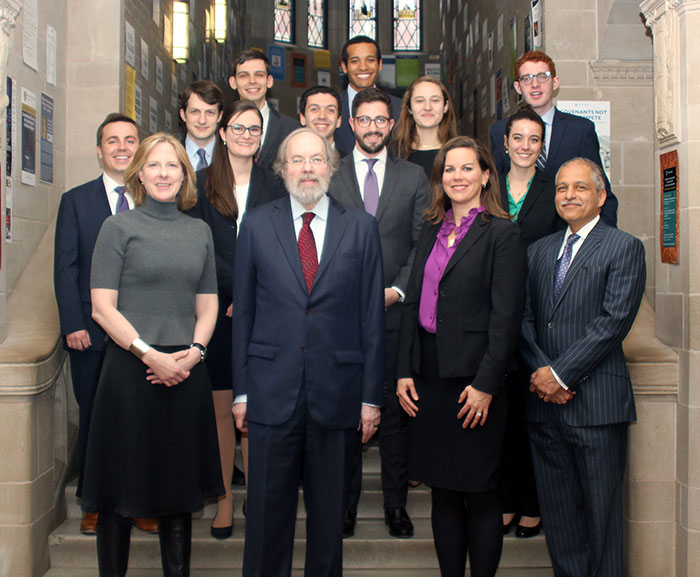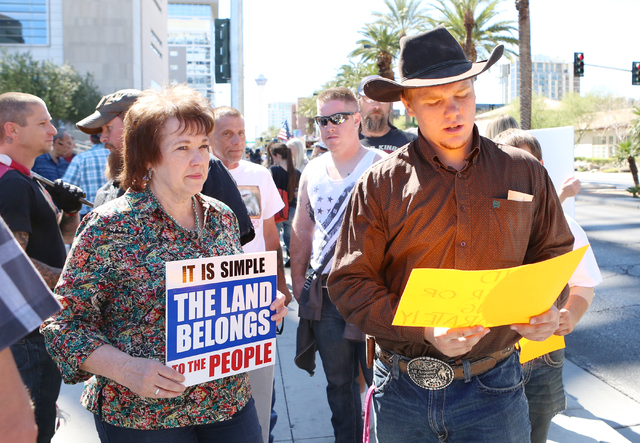
COURT CASE AGAINST BUNDY AND CLARK TRIAL
District Judge Gloria Navarro’s decision to stop a months-long trial in January 2018 for “flagrant” prosecutorial misconduct and her dismissal of the criminal indictment so it could not be re-filed. Circuit Court of Appeal in San Francisco denied prosecutors’ efforts to overturn U.S. appeals court refused Thursday to resurrect the criminal case against states’ rights figure Cliven Bundy, family members and others stemming from a 2014 armed standoff with federal agents trying to round up Bundy cattle near the family ranch in Nevada. Please look at the time stamp on the story to see when it was last updated. The bureau was implementing two federal court orders last year to remove Bundy's cattle after making repeated efforts to resolve the matter outside court, Kornze said, adding the rancher has not paid grazing fees in 20 years.This is an archived article and the information in the article may be outdated. It's the latest skirmish since the 1980s when the Sagebrush Rebellion challenged federal ownership of Nevada rangeland ranchers said was rightfully theirs.Ī federal judge in Las Vegas first ordered Bundy to remove his trespassing cattle in 1998. How do we teach our government not to be big bullies?" according to the newspaper. Others waved placards reading, "This land is your land," and "We teach our children not to bully. The crowd protesting Saturday recited the pledge of allegiance, and many offered prayers. "Good morning America, good morning world, isn't it a beautiful day in Bunkerville?" Bundy told a cheering crowd after his cattle were released, according to the Las Vegas Review-Journal. Rancher Cliven Bundy poses for a photo outside his ranch house on April 11, 2014, west of Mesquite, Nevada. His Mormon family has operated a ranch since the 1870s near the small town of Bunkerville and the Utah and Arizona lines. land without required grazing permits for over 20 years.īundy, 67, doesn't recognize federal authority on land he insists belongs to Nevada.

The 400 cows gathered during the roundup were short of the BLM's goal of 900 cows that it says have been trespassing on U.S. "I urge all the people involved to please return to your homes and allow the BLM officers to collect their equipment and depart without interference." Dean Heller, R-Nev., said in a statement.

"The dispute is over, the BLM is leaving, but emotions and tensions are still near the boiling point, and we desperately need a peaceful conclusion to this conflict," U.S. Nevada's congressional delegation urged the protesters to be calm and to leave the area. "Given the circumstances, today's outcome is the best we could have hoped for." "The safety of all individuals involved in this matter has been my highest priority," Sandoval said. He earlier criticized the agency for creating "an atmosphere of intimidation" and trying to confine protesters to a fenced-in "First Amendment area" well away from the sprawling roundup area. Brian Sandoval issued a statement praising the agency for its willingness to listen to the state's concerns.

Kornze's announcement came after Bundy repeatedly promised to "do whatever it takes" to protect his property and after a string of raucous confrontations between his family members and supporters and federal agents during the weeklong operation. The bureau revoked Bundy's grazing rights after he stopped paying grazing fees and disregarded federal court orders to remove his animals. The dispute that ultimately triggered the roundup dates to 1993, when the bureau cited concern for the federally protected tortoise in the region. The fight between Bundy and the Bureau of Land Management widened into a debate about states' rights and federal land-use policy. Clark County Sheriff Doug Gillespie was able to negotiate a resolution after talking with Bundy, he said. Dan Zehnder said the showdown was resolved with no injuries and no violence.


 0 kommentar(er)
0 kommentar(er)
